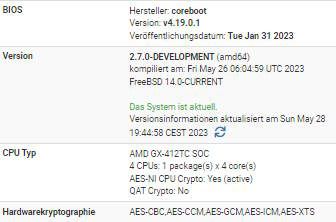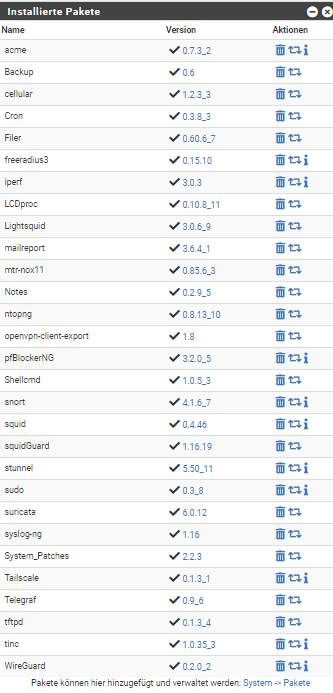Several vulnerable packages without update
-
Hello
Nessus scanner detected several un-patched packages
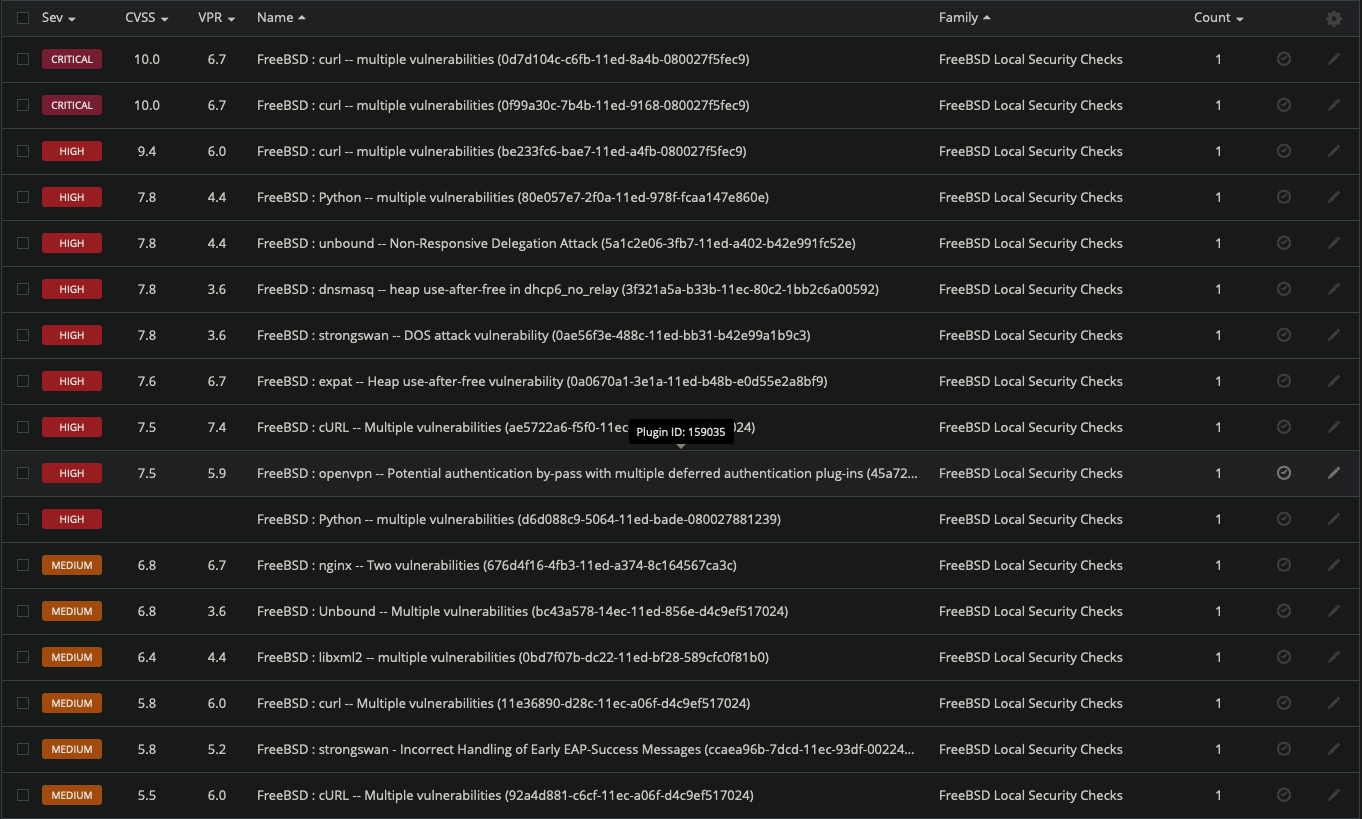
I did the following
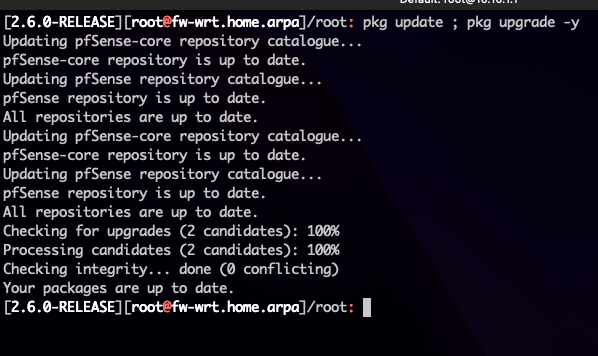
I noticed the new version of some of these packages were released long time ago
how do I patch these packages ?
P.S.
New to Pfsense
Thanks -
@fadinzr said in Several vulnerable packages without update:
how do I patch these packages ?
You just did.
Most packages are not the 'stock' FreeBSD version, but versions coming from the Netgate package serbers.
pfSense doesn't use the stock FreeeBSD package server.'curl' was updated recently.
Also, you are using 2.6.0, that's not the latest version. 2.7.0 will come out soon.
Available right now is pfSense+ 23.01, with 23.05 coming out shortly.Btw : pfSense is a firewall router.
So : no users on the system doing what is needed so the system gets hacked, or becomes a vector for 'external' operators.
No - like none - open ports on WAN interfaces.
On LAN : ports with destination 'pfSense itself: port 53, and port 80 or 443.
Maybe 123 if you want to.
On other LAN interface s: only the ports you want, by default : nothing.So, ok, example, Python has some issue.
First, have to be sure that python part is even used on pfSense. Code that doesn't run can't fail.
Unbound : same thing. I'm using the 1.17.x version right now (pfSense 23.01).
But wait : unbound isn't even listinging on the WAN anyway ...Btw : This kind of observations will pop up ones in a while. Most of them are already known before 'we' (users) know them. Netgate develops Freebsd and pfSense, so, if there was really an issue, an update would be available.
-
@gertjan said in Several vulnerable packages without update:
So : no users on the system doing what is needed so the system gets hacked, or becomes a vector for 'external' operators.
Thanks for replying,
I don't agree with that statement, if a user gets hacked, can't hacker try to hack into router to implement a backdoor for instance.
So do you remove packages that you think you don't need ?
I will wait for next release and hope that these packages get patched. -
With 'users' I mean people having admin access to pfSense, the GUI.
I've many users with their own devices connections to my Wifi captive portal every day. I don't care if they grow flowers for a living, or are affiliated to anonymous.
Firewall rules keeps them out of pfSense.@fadinzr said in Several vulnerable packages without update:
So do you remove packages that you think you don't need ?
pfSense packages ? These : System > Package Manager > Available Packages ? None are installed by default.
These :
[23.01-RELEASE][admin@pfSense.near.by]/root: pkg info 7-zip-21.07_2 Console version of the 7-Zip file archiver argp-standalone-1.5.0 Standalone version of arguments parsing functions from GLIBC avahi-app-0.8_1 Service discovery on a local network aws-sdk-php81-3.232.3 PHP interface for Amazon Web Services (AWS) bash-5.2.2_1 GNU Project's Bourne Again SHell ..... webp-1.2.4 Google WebP image format conversion tool whois-5.5.7 Marco d'Itri whois client wol-0.7.1_4 Tool to wake up Wake-On-LAN compliant computers wpa_supplicant-2.10_6 Supplicant (client) for WPA/802.1x protocols wrapalixresetbutton-0.0.13 Utility to detect platform reset button state for use in scripting xinetd-2.3.15_2 Replacement for inetd with better control and logging xxhash-0.8.1_2 Extremely fast non-cryptographic hash algorithm zip-3.0_1 Create/update ZIP files compatible with PKZIP zstd-1.5.2_1 Fast real-time compression algorithmThey are part of the system.
Every one listed is needed.
Otherwise, it wouldn't be there in the first place.
A pfSense release update will take care of them.pfSense users - that is, the pfSense admin, normally, doesn't need to update / upgrade these files, although, you can run console (SSH) menu option 13, and if packages are available, they will be shown and proposed as an update.
You can not 'debloat' pfSense like you can do with a "Home Windows OS".
@fadinzr said in Several vulnerable packages without update:
I will wait for next release and hope that these packages get patched.
IMHO : none of the issues you've shown are important or related how pfSense uses them, otherwise that info would have been made 'public' on this forum, reddit, redmine, the Netgate pfSense blog etc etc.
-
Also - not wanting to downplay security vulnerabilities in packages - there is a weird trend of CVEs getting up-"voted" with their CVSS score. For example CURL just issued a statement a few weeks ago about its own reported CVEs that were picked up by other authorities and just "revalued" to a high or even critical status when even the folks who actually code the software only voted it "medium". There's quite a bit of scaremongering going on with those institutions and as GitHub or Nessus connect their scan databases against theirs we have result pages like yours (OP) that scream terror and panic all over the place - without setting it into context or the big picture where they are applied.
So the nessus scan results - while maybe true - may not show your reality or use case as it doesn't detect "pfSense" (or other distros based on FreeBSD) and only reports generic FreeBSD CVEs and dangers.
For reference have a look at Daniel's blog here about how NVD just seems to rolls dice for CVSS scoring :)
https://daniel.haxx.se/blog/2023/03/06/nvd-makes-up-vulnerability-severity-levels/ -
@gertjan said in Several vulnerable packages without update:
@fadinzr said in Several vulnerable packages without update:
how do I patch these packages ?
Also, you are using 2.6.0, that's not the latest version. 2.7.0 will come out soon.
pfSense 2.6.0 is the latest and greatest Released version of pfSense CE. Yes, 2.7.0 is the latest beta version of CE and will HOPEFULLY be released sometime in the future.
Available right now is pfSense+ 23.01, with 23.05 coming out shortly.
pfsense+ versions are a different version of pfSense and should not be compared to the CE versions since they are not the same.
-
@fadinzr said in Several vulnerable packages without update:
how do I patch these packages ?
You have several choices for doing so.
- Patches for the entire pfSense system (OS)
Install the patch system and have a look over that patches you will need or you should apply
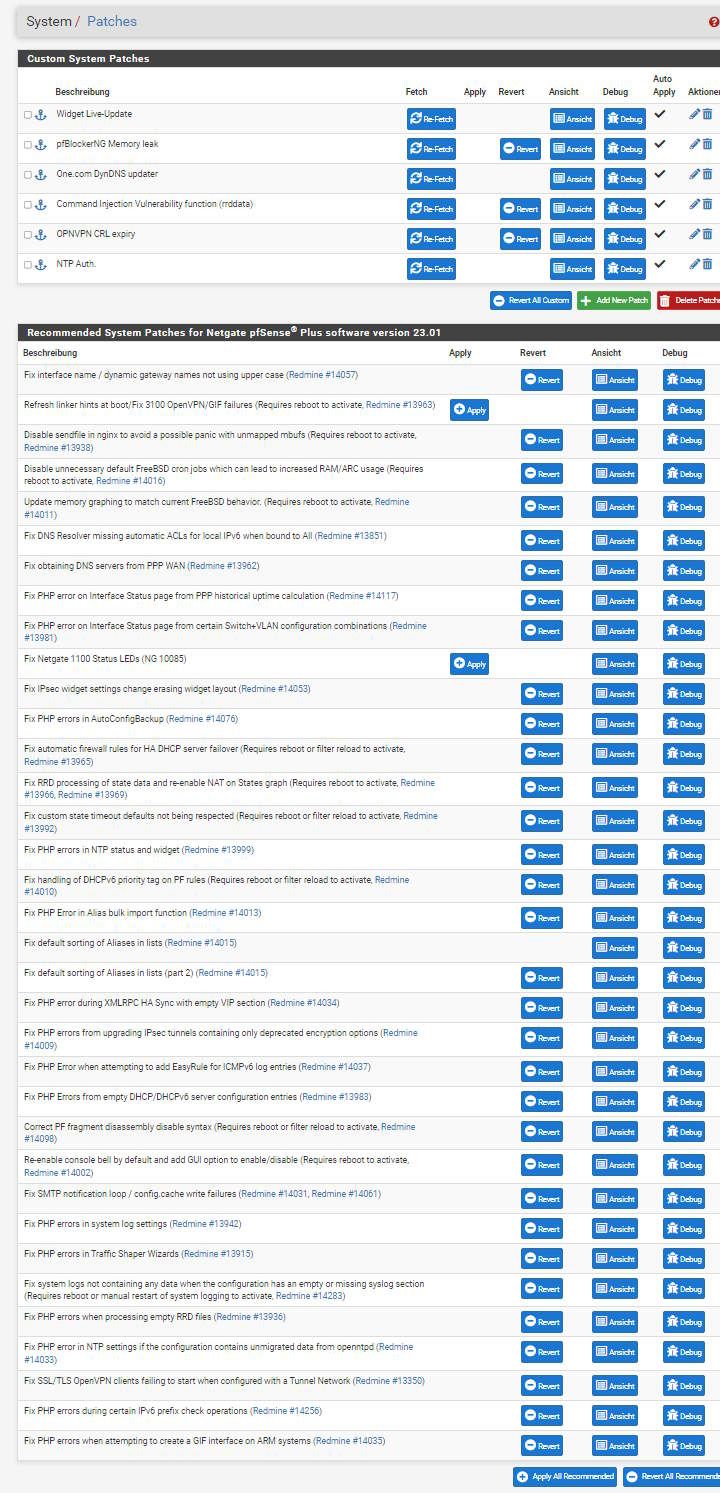
Or have a look in the WebGui

-
Patches for the packages (pkg system)
Have a look in the widget what pkg`s will be able to update or upgrade (WebGui)
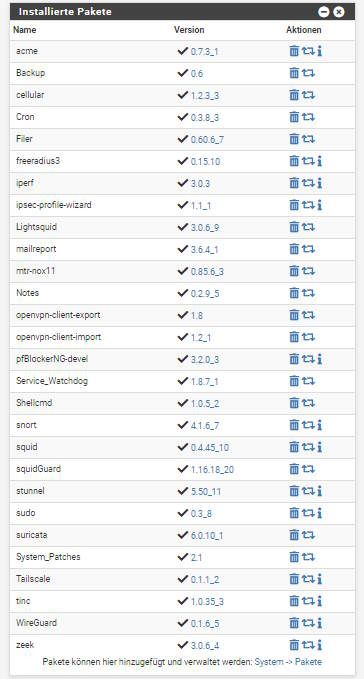
If there will be an update it will be shown there sorted with a plus (+) sign! -
And all also over the console like you have done!
Use PuTTy and connect to the console and run
[2.7.0-DEVELOPMENT][root@xx xx xx]/root: pkg update[2.7.0-DEVELOPMENT][root@xx xx xx]/root: pkg upgrade[2.7.0-DEVELOPMENT][root@xx xx xx]/root: pfSense-upgrade - Patches for the entire pfSense system (OS)
-
I'm using Pfsense CE 2.6.0-RELEASE, waiting for 2.7.0 and hoping that will resolve these vuln
-
Didi you install the patch system? If not try it out
and apply to the patches and then rescan your
pfSense once more again please. -
I just installed "System Patches" package, wonder what is the best way to backup pfsense before installing any patch?
Also what the reliability of these patches ? I will need to read more about it before I use it.
These patches seem to address pfsense OS not packages vulnerabilities. I doubt installing these patches will make these vuln disappear.
-
@fadinzr said in Several vulnerable packages without update:
These patches seem to address pfsense OS not packages vulnerabilities. I doubt installing these patches will make these vuln disappear.
-
System patches are patching the entire OS
up to date system, fast reaction on vuln. are given -
pkg update & upgrade are installing newer packages
up to date packages, faster reaction on vuln. & functions -
patch system (own patches)
you may be able to write your own patch! Gives you a part of the control
-
-
@fadinzr said in Several vulnerable packages without update:
These patches seem to address pfsense OS not packages vulnerabilities. I doubt installing these patches will make these vuln disappear.
There is no "pfSense OS". pfSense itself is a sum of packages that runs on a custom collection and kernel of FreeBSD. Done. So it's a minimized/customized FreeBSD install with custom packages (pfSense-xy) and system/service packages which are built by the team itself for pfSense and are managed in their own repository.
System Patches only does small changes that can be in UI code (PHP) or configs, that are easily switchable (with a diff/patch) - so the package doesn't installs/updates any new packages or big things but only fixes smaller level stuff. But that can be a config that exposes too many information, so can be relevant for such a scan.
Running pkg update is another way for a few packages that got fixed by Netgate in their repository. But you won't see the FreeBSD upstream fixes there as the packages are not the same.
But besides that: having some "vulnerabilities" displayed by a scan FROM INSIDE your network isn't the same view as from OUTside your network. Additionally I'm not sure how your nessus scan is able to check for things like CURL etc. without having actual access to the system and that would be quite a strange use case for such a security assessment as NO user besides network admins get access to my firewall. So I don't understand how half that list is actually scanned for as e.g. cURL is nothing that is running as a service. So either your scan is making assumptions that may or may not be true or you are scanning with a privilege level on the system itself that is unreasonable.
-
@jegr said in Several vulnerable packages without update:
"vulnerabilities" displayed by a scan FROM INSIDE your network ....
Still, this is a very limited view.
As the list shown above is obtained "FROM INSIDE pfSense itself".
Or : the installer USB image is unwrapped, and scanned.By default, nothing can be obtained from the WAN interface.
By default, the LAN interface will answer on port 80 TCP (or 443 TCP as no one like 'http' these days) and port 53 UDP/TCP.
So, not 100 % sure, but a 'packet analyser' could indicate that pfSense uses :- nginx as the web server.
- unbound as the DNS 'server'.
- and because Ethernet packets are build by the OS (the NIC drivers), with some guessing it's even possible that the underlying OS, FreeBSD, can be recognized.
Knowing that the LAN interface should only be used or made accessible to/for devices that you really trust, and that all other devices should be placed on another LAN segment, where only port '53' is made available. Or even better : nothing, so no access pfSense itself at all.
When the 'pfSense by default' mode is used, everything boils down to just one question :
How sure is 'pf', the pfSense firewall ?
With 'by default' I mean : no gadgets. No pfSense packages. Nothing.The question 'how sure is pf ?' can be answered as the source is for everyone who want the real answer to the real question. In case of doubt, check the source of the compiler, then compile the compiler to build itself (build the entire tool chain while you're at it) and then build 'pf' (and FreeBSD).
Now, you're safe
That dnsmasq exists on the disk (not used by default) or 'OpenVPN', 'curl', or 'python', this can can not be detected from the outside. Any side.
As always : the most secure software is the software that isn't used.
Even more secure : minimum OS + 'pf ' - no GUI, no gadgets, nothing (again).Btw : the best and fastest result would be obtained by removing the most obvious insecure element, not yet named : the admin.
-
@gertjan My intention is not to shoot against testing. That's important and right. But thing is, most testings are done with such scanners like nessus, greenbone etc. that run a list of checks for detection, then run a big list of CVEs for that OS/distro etc. etc. but all in all is only a very limited use and view, as it doesn't take into account if a CVE etc is relevant or even important in that context. And the context of a firewall is often vastly different to those of a FreeBSD service with standard packages installed etc.
And with the scaremongering going on as we see high-pitched CVE alerts that are completely out of scope where even the developers of the software are scratching their head as to why the score was given, I don't see automated scans as a really good way to secure a system. It's more or less a tool of some XYZ compliance factsheet that helps someone make checkmarks behind a ToDo list of things so e.g. an insurance company is "happy" and you can document, that you did "everything by the book" but were hacked nonetheless. Just wanted to shine some light on that , not wanting to discuss package updates away ;)
Cheers
-
Thanks all for your insights and feedback
-
[23.05-RELEASE][root@xx xx xx]/root: pkg audit -F vulnxml file up-to-date libxml2-2.10.3_1 is vulnerable: libxml2 -- multiple vulnerabilities CVE: CVE-2023-29469 CVE: CVE-2023-28484 WWW: https://vuxml.FreeBSD.org/freebsd/0bd7f07b-dc22-11ed-bf28-589cfc0f81b0.html curl-8.0.1 is vulnerable: curl -- multiple vulnerabilities CVE: CVE-2023-28322 CVE: CVE-2023-28321 CVE: CVE-2023-28320 CVE: CVE-2023-28319 WWW: https://vuxml.FreeBSD.org/freebsd/a4f8bb03-f52f-11ed-9859-080027083a05.html py39-setuptools-63.1.0 is vulnerable: py39-setuptools -- denial of service vulnerability CVE: CVE-2022-40897 WWW: https://vuxml.FreeBSD.org/freebsd/1b38aec4-4149-4c7d-851c-3c4de3a1fbd0.html redis-7.0.10 is vulnerable: redis -- HINCRBYFLOAT can be used to crash a redis-server process CVE: CVE-2023-28856 WWW: https://vuxml.FreeBSD.org/freebsd/96b2d4db-ddd2-11ed-b6ea-080027f5fec9.html 4 problem(s) in 4 installed package(s) found.